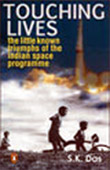Apr 14, 2025
Apr 14, 2025
Villager after villager tells the author - who was then in the finance department of ISRO - how they decided to send their children to school or improve the working of the local panchayat or plant trees in the village commons after watching the TV programmes. Title: "Touching Lives - The little known triumphs of the Indian space programme";
Title: "Touching Lives - The little known triumphs of the Indian space programme";
Author: S.K. Das; Price: Rs.250; Publisher: Penguin
Many people know about the satellite launches of the India Space Research Organisation (ISRO). But few know how the activities of ISRO affect ordinary Indians every day. In his book, "Touching Lives", author S.K. Das throws light on this aspect in a simple but effective manner.
Television programmes such as "Krishi Darshan" have been much criticised by reviewers. But Das takes you to the remote Jhabua district of Madhya Pradesh to show the effect of such development communication on villagers who are watching television for the first time, thanks to an ISRO satellite and TV sets provided by the organisation.
If proof of the popularity of such programmes is needed, it is provided in the way local bureaucrats tend to take the TV sets home for personal viewing whenever they can get away with it, as Das found.
As the bureaucrat-turned-temporary reporter moves from Madhya Pradesh to Orissa, he finds local engineers using groundwater maps provided by ISRO satellites to dig wells in drought-prone Koraput district.
On to Chamarajanagar, on the edge of then-Veerappan country at the Tamil Nadu-Karnataka border. It is a typical backwater with a government school filled with broken furniture - except for a box that guards the TV set in the classroom through which students can take part in distance education programmes beamed through ISRO's satellite.
The author meets the village school topper who says he does not have to go to Bangalore and Mysore and put an extra financial burden on his poor father anymore, because the lessons he now gets through TV are just as good, if not better.
Das goes through a plethora of these experiences that seem simple and everyday to the people he meets. But points out that they do not take for granted the advantages brought by ISRO. They know the value of the difference it has made to their lives.
In Lakshadweep, the fishermen now wait for ISRO to tell them where the schools of tuna are, thus saving up to a third of their fuel and time.
In Tripura, patients gather around a district hospital to get specialized healthcare from doctors in Bangalore and Kolkata, thanks to the connectivity provided by ISRO.
In Karnataka, a woman sarpanch knows exactly what her rights and duties are, thanks to another educational programme beamed by an ISRO satellite and shown on an ISRO-sponsored TV set.
In Garhwal, ISRO tells local engineers where the next landslide is likely to occur. It also tells whoever cares to listen exactly how deforestation has made the Himalayan ecosystem more fragile.
In the Sundarbans, ISRO satellites map and monitor the wetlands while its scientists use this data to make a conservation plan.
In Kerala's scenic Western Ghats, weather data provided by ISRO satellites allow tour operators to plan the day for their clients.
In Tamil Nadu's Cauvery delta, a network set up by ISRO advises farmers on what crops to plant in the coming season and where to market their produce.
The book is replete with such examples that add to up to a very large revolution indeed in the lives of millions of Indians. Das has done valuable service to both policymakers and readers by chronicling this change with such painstaking detail.
17-Aug-2007
More by : Joydeep Gupta